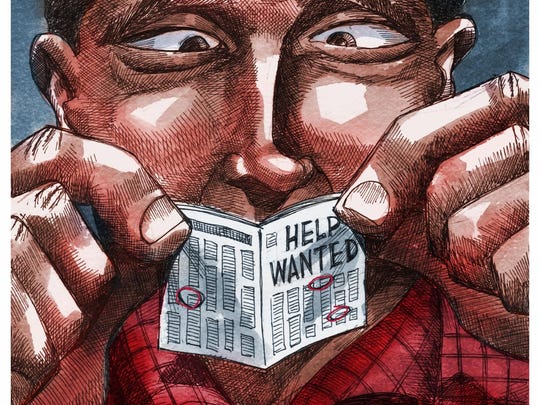Reed Hundt on the “Pandemiconomy”
In post-pandemic economy, your job may be gone for good | Opinion
May. 6th, 2020

Trying to help Americans cope with the twin crises of virus and shutdown, a bipartisan Congress has spent $3 trillion, mostly to keep big and small businesses going and Americans able to pay for necessities. Now, state and local governments are taking steps toward re-employment for more than 20 million people who have lost their work and more than 100 million who cannot effectively work from home.
Everyone must realize that we cannot return to the way we lived and worked before the crises. Therefore, in thinking about its next stimulus, Congress has to begin to focus on creating jobs of the future, as opposed to spending still more money in the hope of holding the old economy in place.
There are at least two reasons the American society and economy cannot be restored to the pre-crisis status quo.
First, as the global epicenter of viral disease and death, the United States is far from defeating the plague. At least for now, experts say, we have to focus on creating jobs that can be done safely, preferably with protective equipment and out-of-doors.
Second, the new economy — let’s call it the “pandemiconomy” — has accelerated a shattering shift from real to virtual that commenced with the arrival of the commercial Internet and digital mobile, the two events that occurred when I became chairman of the Federal Communications Commission in 1993. Changes that have unfolded slowly over the last three decades have now occurred in mere weeks.
More: U-M economists: Michigan’s jobs outlook worse than Great Recession
More: How to file for unemployment in Michigan: What you need to know
We have Zoomed from traffic congestion, cubicle closeness, and crowded events to a combination of physical distance and electronic closeness. Although all of us long to embrace our separated loved ones, none of us will unlearn the new habits of e-everything.
Our current cultural norms are vital for health reasons. They have also revealed new efficiencies and conveniences that employers and employees will want to maintain. Work from home, videoconferencing, Internet-based medical advice, delivered products, reduced business travel are just some of the new habits that will stick. As a consequence, hundreds of thousands of businesses will shrink, and many will vanish.
The non-survivors will come largely from these ranks: a million restaurants, a million retail stores, a hundred and fifty thousand new and used car dealerships , a hundred thousand gas stations, fifty thousand travel agencies, fifty thousand hotel properties, ten thousand public libraries, five thousand movie theatres, a thousand local newspapers , and 18 major airlines.
Rapid change in the ranks of employers and composition of workforce is a feature of American capitalism. Of the six million firms that have employees, about a million go out of business annually. In good times, another million start up.
In this plague year, however, it is highly likely that far more than a million firms will disappear and most of the necessary new firms won’t be formed until after the virus is quelled, probably late in 2020 and in 2021. This is a hard truth Congress must accept as it thinks how to help the country climb back to full employment.
Good prospects, however, exist for firm and job creation in e-commerce, e-education, telecommunications, on-line media, electronics, domestic manufacture and agriculture, and insurance. It also is important for Congress to create incentives for the 20,000 businesses that have more than 500 employees to expand their operations.
Another inevitability is that new companies and new jobs will not necessarily be located where the unemployed live. Nor will the new work require the same experience as the old, vanished positions.

It’s fruitless for legislators to count on rapid retraining, or to suppose that millions of families will happily sell their homes, escape their leases, and travel to wherever they can find work. In thinking about the way Americans will live and work in the post crisis era, government should grasp that people need work in their communities. It should be able to be done safely. It should be productive. And it should be work to be proud of.
The biggest, most useful category that lets people engage in meaningful, local, honorable work is construction. Numerous trades and skills are involved, and many activities are also well suited for apprenticeship programs.
The list of what to build is long and the locations are nationwide: renewable energy generation at utility and community scale, rooftop solar installation, electric car sales and charging stations, high voltage transmission for clean power, renovation in every building in the country to consume less electricity, upgrading everyone’s water and sewage systems, distribution of health care facilities in short driving distance from 100% of the country, high speed broadband for every home no matter how remote or urban, patching and expanding transportation routes for goods and people.
The vast bulk of this construction work occurs outdoors, or can be done with distance and in personal protective gear. Already the governor of Michigan has identified construction as a right first step toward jump-starting the state’s economy. Similarly, Congresswoman Debbie Dingell’s proposed National Climate Bank is an engine for construction job creation.
In general, every $70,000 spent on such construction work creates a job for a year: five trillion dollars of investment in these activities translates to about seven million jobs per year for a decade. That is a good ballpark number both for the amount of work that needs to be stimulated and the price tag for building the country’s infrastructure anew.
Scaling up construction means roughly doubling the number of jobs in the sector:
Also desirable is the potential to mix public and private investment. Most of the necessary work in energy and communications will be for privately owned and operated entities. The public institutions can be governed with apolitical commissions or non profits. If the public spending does not go through the politicized bureaucracies of government, it can efficiently combine with two to four times the amount of private sector funding. Over time, such public spending can literally pay for itself if funded with very long-term debt and reasonably equity. The result would make this crisis a turning point toward a better, cleaner, more productive America.
Reed Hundt is the CEO of Coalition for Green Capital, a non-profit that seeks public money to combine with private money for investing in clean power projects. He was chairman of the Federal Communications Commission from 1993 to 1997.
Read or Share this story: https://www.freep.com/story/opinion/contributors/2020/05/06/post-pandemic-economy-permanent-job-loss-opinion/5175282002/

Reed – loved your article on the “Pandemiconomy”. You stated much more eloquently and in greater detail what I’ve been telling whoever will listen. Namely, that the fed’s handout of trillions to prop up business’s and individual’s outdated ways of working and living will do nothing but saddle an anachronistic future with unworkable debt that paralyzes needed change. We must find a way to overcome the huge past investment that fixates the USA in an outdated physical, financial and social environment. This is why countries building their infrastructures anew now are rapidly outpacing us.
Instead of supporting the old ways with handouts that increase the burden of our outdated investment, the fed should follow FDR’s approach by directly subsidizing projects that create a future that has been struggling to emerge without support from government. This means financially supporting infrastructure projects that enable new modes of transportation, communication, commerce and education. This will require financing not only shovels ala the Civilian Conservation Corps but also educating and supporting new skills for trades-men and -women , engineers and scientists (not to mention thinkers, writers and artists who will envision newly emerging ways of life).
Otherwise, as you stated elsewhere, we will have had another “good crisis wasted”.